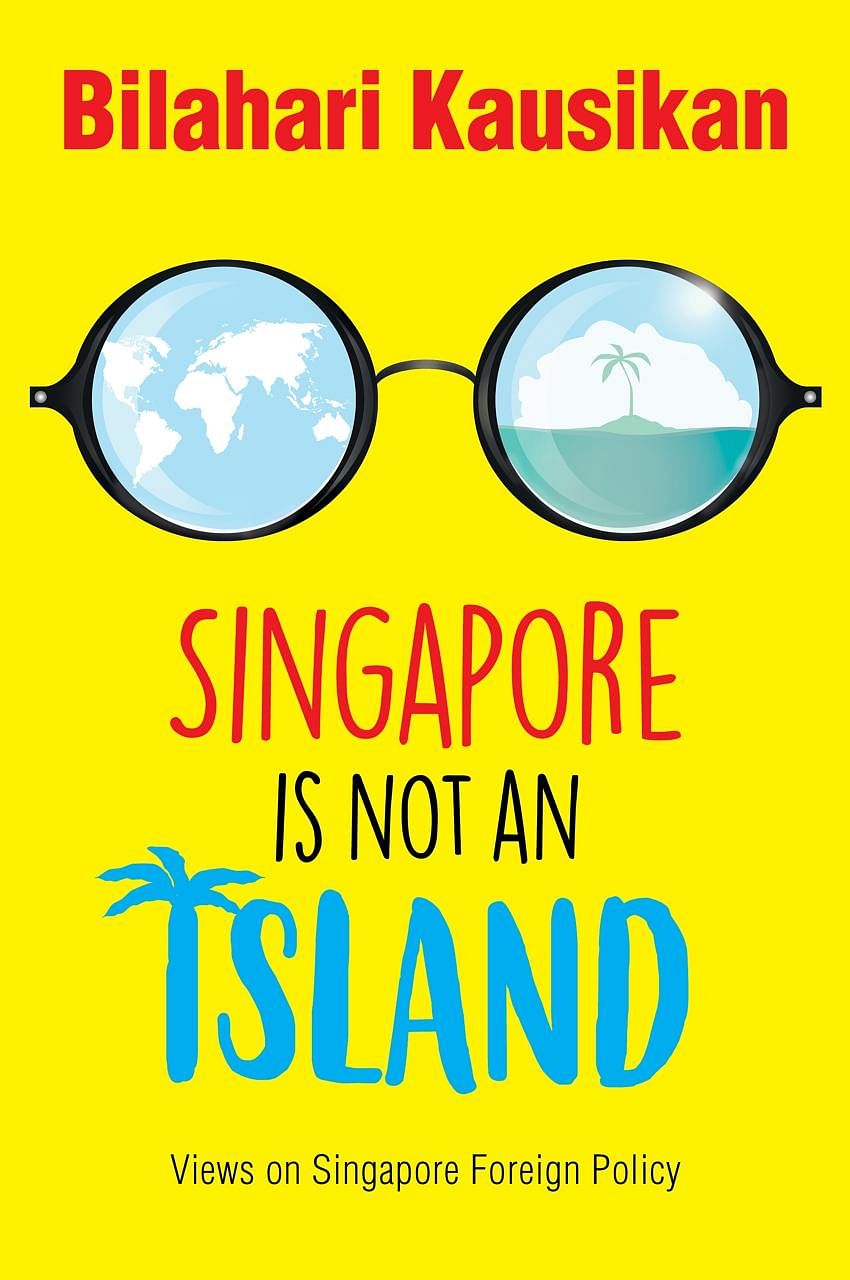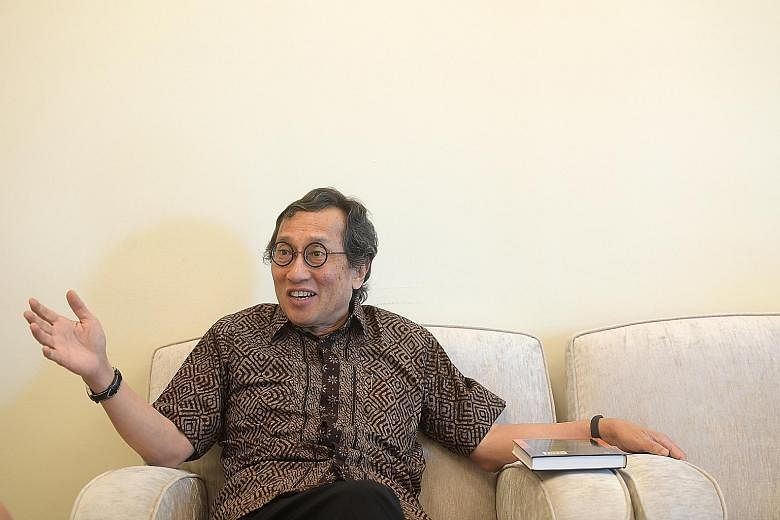Just how does one describe Ambassador-at-Large Bilahari Kausikan? Well, it depends on who you ask.
Some laud him as one of the finest minds in Singapore's public service. Others label him the "undiplomatic diplomat" who says what he thinks and means what he says.
He's also known as the "prolific public intellectual" who has an expansive vocabulary with which to take down those whose arguments fall short of his exacting standards.
Just last week, he took issue with Professor Kishore Mahbubani, the dean of the Lee Kuan Yew School of Public Policy, who wrote a piece in The Straits Times suggesting that small states should not behave like big ones.
In a Facebook post, he described Prof Mahbubani's reasoning as "muddled, mendacious and indeed dangerous".
"I am profoundly disappointed that Kishore should advocate subordination as a norm of Singapore foreign policy. It made me ashamed," he wrote of his former colleague at the Ministry of Foreign Affairs.

Meeting The Sunday Times early on a Wednesday morning, the veteran diplomat laughs when told that he has a reputation for chewing people up and spitting them out.
"Only on Tuesday, Thursday and Saturday. On Monday, Wednesday and Friday I merely suck their blood," quips the former permanent secretary of foreign affairs who recently released the book, Singapore Is Not An Island: Views On Singapore Foreign Policy. Published by Straits Times Press, it is a collection of Mr Bilahari's essays and speeches over the years.
The 61-year-old, who became Ambassador-at-Large after retiring from the Administrative Service in 2013, is in a good mood, and in good form as he talks about the book and gives his take on foreign policy and geopolitical and social issues ranging from Trump and China to North Korea and Pink Dot.
He whips out a volume, not his own, when asked about the state of Singapore-China ties. Is Singapore's policy of not choosing sides in the face of US-China rivalry, and its position on the South China Sea earning the ire of the Middle Kingdom?
"I knew you were going to ask this question and I want to show you this book," he says, brandishing a copy of Qiaowu: Extra Territorial Policies For The Overseas Chinese by New Zealand political scientist James Jiann Hua To. Qiaowu refers to China's interactions with its diaspora.
Chinese foreign policy, opines Mr Bilahari, is conducted along three tracks.
"One is the official track. There will always be ups and downs... but by and large, it's quite good," he says, referring to recent headlines saying that Singapore and China have agreed to deepen cooperation on the Belt and Road initiative and speed up the conclusion of free trade agreements between them.
The second track, he continues, is about unofficial influence. He cites several examples, including recent reports in which Australia's intelligence agencies expressed concerns that China was interfering in the country's institutions and using political donations to gain access.
The "highly developed" third track is qiaowu, used for dealing with overseas Chinese.
"There are many overseas Chinese communities around the world but Singapore is the only independent country which has a majority ethnic Chinese-origin population and, in our case, the second and third tracks merge," he says.
"If you read the book, there is an assumption that the overseas Chinese will define their interest in terms of China's interest and that is a norm we cannot accept. Yes, 75 per cent or more of our population is ethnic Chinese but Singaporeans have become very different from PRC (People's Republic of China) Chinese in many ways," he says.
"When the Chinese try to force this appellation on you in ways subtle and not so subtle, you must resist because it is existential, it's a matter of survival."
Why?
"A quarter of our population is not of ethnic Chinese origin. Supposing we are ever foolish enough or we are forced to accept the characterisation of Singapore as a Chinese country, and the norms that are assumed to follow from that... the multiracial social compact on which Singapore is based will be broken. Once broken, can you put it together again? I don't think so. They (the Chinese) don't understand. And that, Singaporeans must understand."
He says Singapore, although a young country, has "a system and framework where people can be themselves and yet be together" which is unique and needs to be vigorously defended.
"A small country like ours will always be subject to multiple influences of various kinds: political, cultural, religious, linguistic, you name it. But we have to have the gumption and the courage to be ourselves."
How about the statecraft practised by China's main rival, the United States, especially since Mr Donald Trump became President earlier this year?
"There are things to worry about him on the trade front," he says, referring to Mr Trump's abandonment of the Trans-Pacific Partnership and his brand of protectionist trade policies which is generating a lot of global pushback.
"Then there is this question of Islamophobia. If the administration is perceived as Islamophobic, it will certainly become more difficult for governments in countries which have majority Muslim (communities) in our region to maintain, over time, a friendly attitude towards the US. And that will have geopolitical consequences," he warns.
But he says that not all that the Trump administration has done is dire. He points to the reaffirmation of alliances with the likes of Japan, South Korea and Australia as positive, as well as Mr Trump's plans to attend the Asean-US, East Asia and Asia-Pacific Economic Cooperation summits.
"The 7th Fleet has never left," he says, referring to the US military formation headquartered in Japan and tasked with, among other things, the defence of the Korean Peninsula.
In fact, he reckons there are things the Trump administration has done better than the previous one under Mr Barack Obama.
"I think it was a fundamental mistake for Mr Obama to have drawn a red line over the use of chemical weapons in Syria and then do nothing. It just eroded the credibility of American commitments. And so, Mr Trump has done something to correct it by bombing Syria and doing it while having dinner with Mr Xi Jinping to boot," he says. In April this year, the US President informed the Chinese leader of his country's missile strikes against Syria's military over dinner at his private Mar-a-Lago estate in Florida.
He also says the Obama administration's policy of "strategic patience" was a big mistake which allowed North Korea eight years to develop its missile and nuclear weapon programmes.
The Trump administration's decision to deploy two carrier strike groups near Korean waters in response to recent North Korean missile tests was, hence, a good move.
"Sooner or later, North Korea will have a nuclear-capable ICBM (intercontinental ballistic missile) that can reach the US and it will be the right thing for Trump to maintain deterrence by showing resolve through a show of overwhelming force now," says Mr Bilahari, who is well-known internationally for his strategic analyses.
It won't change North Korean behaviour, but it will be a deterrent.
"And that's how nuclear powers have always dealt with each other ever since there were nuclear powers: by deterrence."
Contrary to what many people think, North Korean leader Kim Jong Un, he says, is not a "nutjob".
"He's a very clever guy and coldly rational. I think the North Koreans are bad but they've never been mad. How can you call him mad when he's got what he wants and nobody has been able to stop him? He is setting the pace, not others," says Mr Bilahari, who was once Singapore's permanent representative to the United Nations and ambassador to Russia.
The conversation shifts closer to home when asked for his take on Malaysia's coming elections and the return of Tun Dr Mahathir Mohamed - who now heads opposition party Parti Pribumi Bersatu Malaysia - to politics. The former premier has been lobbying for the ouster of Prime Minister Najib Razak over allegations involving state fund 1Malaysia Development Berhad.
"Well, I should certainly hope Barisan Nasional and Prime Minister Najib are returned but it is not my business. Whoever is in charge in Malaysia, we will have to deal with just as we deal with whoever is in charge in Botswana... or Britain, the US, Japan or any country... It'll be easier to deal with some kinds of government but you still have to deal with them," he says.
In Singapore Is Not An Island, he emphasises more than once the need to adapt in the face of a changing world and a changing Singapore. "We can only improvise wisely if we accept the world as it is and not as we hope or fear it to be," he writes in one essay.
In Singapore, for instance, he believes the rise of civil society and advocacy groups will make policy crafting trickier.
When asked about Pink Dot, the annual lesbian, gay, bisexual and transgender (LGBT) rally which attracted nearly 20,000 people last weekend, he says the use of cultural issues such as LGBT rights as a means of influence is fairly new in Singapore.
"I think, in this instance, the objective for some is really political influence. If you ask me, people should live the life they want to live but that's only me. I'm sure there are a number of Singaporeans who agree with me. In fact, I would say the majority of Singaporeans would say: Live and let live. Now that does not mean that they would go as far as to say you should have same-sex marriage and things like that. That, for many people, is a step too far. Personally, I'm not opposed to same- sex marriage but others care vehemently," he says.
The result, he says, is a compromise.
"You have certain elements from your criminal law on the books but the Government has announced they will not enforce it," he says, referring to 377A of the Penal Code which criminalises sex between men. "At this stage of our society, that's the best you can do. It's not perfect but this is not heaven, you know."
Mr Bilahari, whose father P.S. Raman was one of Singapore's pioneer diplomats and the country's first ambassador to the then Soviet Union, does not think he is fearless about speaking up on issues.
"All I try to do is write and speak clearly without hedging. That was what I did while a civil servant and what I do now. Before I retired, there was a phenomenon that I noticed creeping into the civil service and which concerned me. Sometimes opinions were so hedged and qualified it was hard to understand what was being suggested."
He adds: "At a time when Singapore is being more insistently subjected to a variety of insidious external forces, this can be dangerous. Writing and speaking clearly does not mean you are always going to be right - nobody is right all the time, particularly when dealing with international affairs where there are many unknowns and human agency is always a factor: Stating an opinion can change the behaviour that was the subject of the opinion. But a clear, unfudged opinion allows error to be recognised early and corrections made early, whereas a fudged opinion conceals error."
He makes no bones about the fact that his rebuttals to other people's opinions could be brutal, leading to charges that he is incapable of "civil" discourse.
"Sometimes issues are too important to let civility get in the way of clarity. Dangerous ideas must be demolished.
"Anyway, when people say someone is uncivil, sometimes it means no more than that they don't agree with an opinion but have no effective substantive rebuttal. Besides, if you state an opinion in public, you must be prepared for it to be attacked robustly; I don't take offence if someone attacks me robustly."


